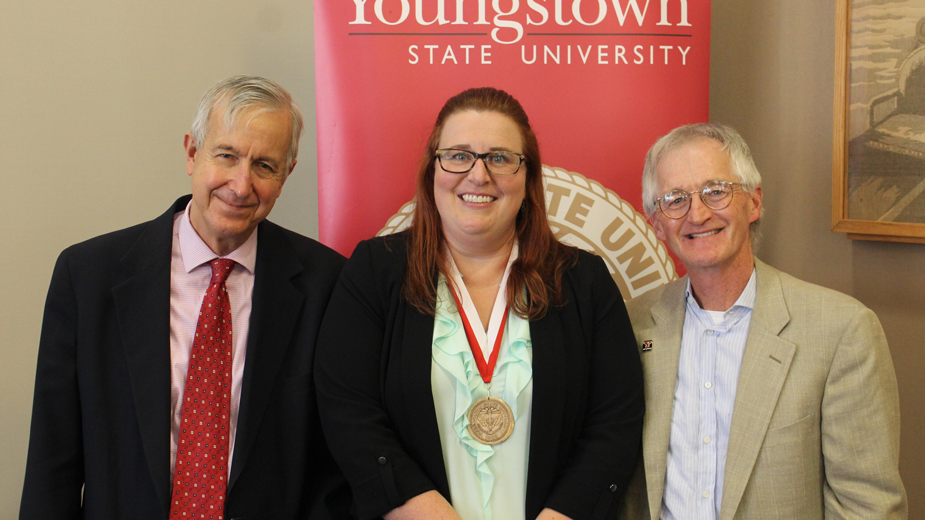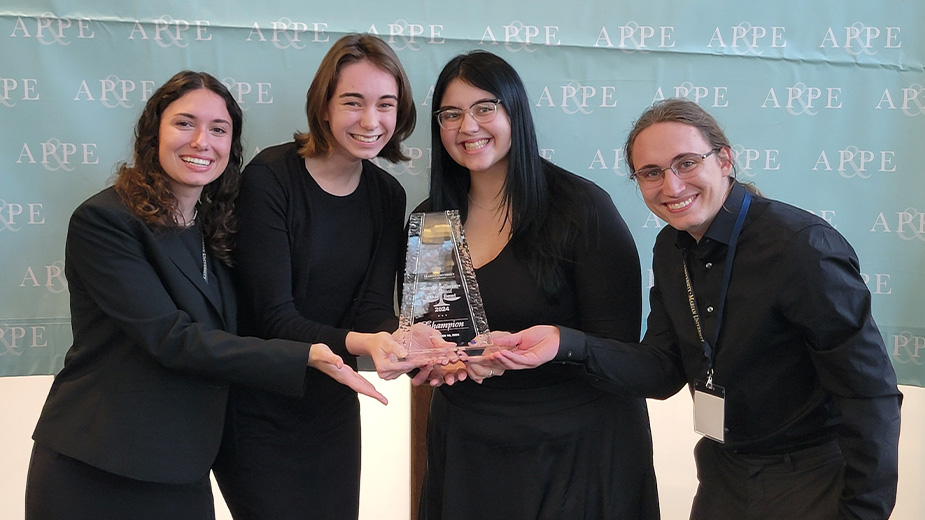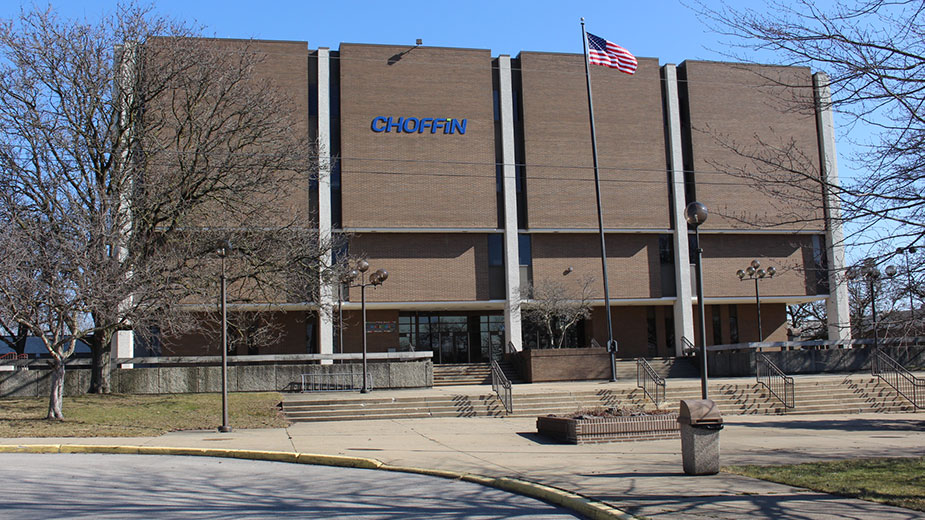Newly Endowed YSU Professor Sees Links to History, Job Skills
YOUNGSTOWN, Ohio – Through his life, Robert Reeder I carried a deep passion for history, especially that of Ohio and transportation.
He visited Canal Fulton every year for its Olde Canal Days celebration. Among his favorite vacation destinations was Sugarcreek – Ohio’s “Little Switzerland – to see the horses and buggies used by the Amish community in Tuscarawas County. Every year, he took part in the steam engine exhibit at the Canfield Fair, always playing a role in the threshing crew. A fan of covered bridges, an example at Old Sturbridge Village in Massachusetts is named for him.
So when his grandson, Robert Reeder III, was ready to endow a professorship at his alma mater, it was a logical choice to support a history professor.
“Wherever there were historical sites, he’d go. He worked on chapters of books about transportation in the 1800s, when projects like the Erie Canal transformed America and the ability to move people and products,” Reeder III said Thursday at the ceremony naming the recipient of the Robert Reeder I Memorial Professorship of History at Youngstown State University: Amy Fluker.
In her new position, Fluker is aiming to not just train historians, but to prepare students for whatever their career path ends up being. History isn’t always as straightforward a path as, say, mechanical engineering, where graduates know they can often get a job straight away in their field.
“I took the most traditional route; I only ever wanted to be a historian. I majored in history, got a master’s in history, got a Ph.D. in history and now I teach history,” Fluker said. “But I know that’s not reality for a lot of students. I don’t want students to not pick the major if they think there’s nothing they can do with it.”
Among her proposals is to create a speaker series, bringing in professionals with history degrees who aren’t working in the field. Already, she’s talked to a journalist and a banker who have history backgrounds. While the exact skills don’t necessarily translate – there isn’t much need to comb through 1800s census data or historic photographs if you work at a bank – the foundational knowledge is “endlessly transferable,” she said.
“History and many liberal arts disciplines teach you to be a really thoughtful individual. With research, analysis and interpretation, no matter what career you choose, those are things you’re going to be asked to do,” she said. “You have to take information, interpret what’s significant and communicate that in a way that’s effective. As a historian, what’s most important isn’t just the research you do, but also how you tell the stories.”
With the attention that careers in STEM – science, technology, engineering and mathematics – garner, Fluker said her field needs to do a better job of outreach and engagement to show students and parents what opportunities are presented by holding a history degree.
“We’re not naturally marketers,” she said. “We need to help students understand how these particular skills that we develop in our program translate so that people don’t automatically think to STEM when it comes to job placement. We need to help people understand that liberal arts has that too.”
Fluker, who has been at Youngstown State since 2018, primarily researches the ties between regional identity and how the Civil War is commemorated. It’s an area that overlaps with Reeder I’s passion for history, she said.
“It strikes me the ways that Mr. Reeder appreciated the ways that past and identity are intertwined. They’re the same threads that run through my own research on the American Civil War and its memory in American culture,” she said. “My work is founded on the idea that how we interpret history, the monuments we choose to build and the historic sites we choose to preserve reveal insights about ourselves, our values and our communities. It helps us understand who we are and what we are no longer.”
In addition to that connection between Reeder I’s work and that of Fluker, Reeder III also noted that her work will help first-generation college students. When a student is the first in their family to attend college, there’s often pressure that the experience result in a well-paying job in a mainstream field.
“I think that was a calculation Mr. Reeder himself had to make as he turned away from his desire to further his own education to work in Youngstown’s steel mills,” Fluker said. “I believe the way to engage and retain first-generation students in history is to engage them outside the classroom. Experiences give them the understanding that studying history isn’t just committing a series of past events to memory.”
Reeder III and his two siblings – his older sister was the first in the family to attend college – all hold undergraduate degrees from YSU. His sister is now a CPA and his brother is a chemistry and biology professor at Morehead State University in Kentucky.
Reeder himself is a partner at Sullivan & Cromwell LLP in New York City.
“Youngstown State gives people like me, my sister and my brother a platform to grow and excel. I can’t tell you enough how much it means that the professors at this university teach and care about students,” he said. “They propelled me. Without them, I never would have excelled in law school or at law practice. But because they took the time to help a nobody, an Ohio farm boy, I can stand here today and create these professorships.”
By helping first-generation college students, YSU can help create citizens that can “set the world on fire.”
“Those first-generation students are eager to learn, learning new things and they’re excelling,” he said. “This is helping enable that youth to go out into society – whether it’s here in the Mahoning Valley or anywhere else – and be successful.”
The $1 million donation was made as part of the Youngstown State University Foundation’s We See Tomorrow campaign. After hitting its initial $100 million goal in January – 18 months ahead of schedule – the foundation increased the target by $25 million.
“When COVID hit in March, April and May, our numbers did slow, but since June our benefactors have answered again,” said Paul McFadden, the foundation’s president. “Mr. Reeder’s gift is a testament to that. We’re back on track after a couple of slow months and hopefully we can continue this momentum.”
Reeder III also funded the Grace Ruth Professorship in English in memory of his grandmother in 2017. Since the We See Tomorrow campaign began in 2017, YSU has expanded from three endowed professorships to 18.
“The two biggest components are providing funds for our students and providing funds for our faculty in terms of professorships,” YSU President Jim Tressel said in brief remarks before taking part in Gov. Mike DeWine’s coronavirus briefing. “To see the impact that it’s had, moving from three to 18 chairs and professorships, it really makes a difference.”
Pictured: Beeghly College of Liberal Arts, Social Sciences and Education dean Charles Howell, Robert Reeder I Memorial Endowed Professor of History Amy Fluker and Robert Reeder III, who donated $1 million to create the position in honor of his grandfather.
Copyright 2024 The Business Journal, Youngstown, Ohio.



